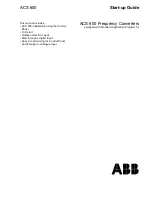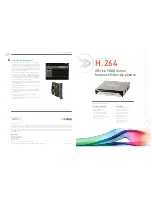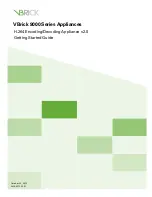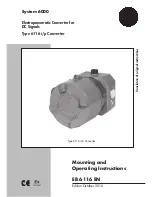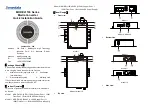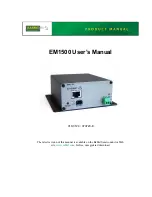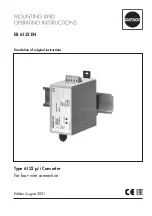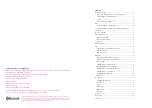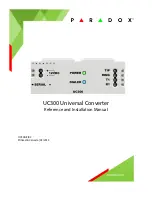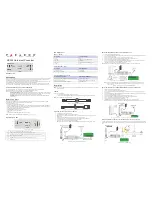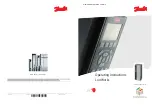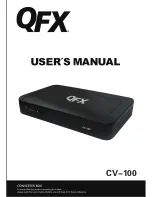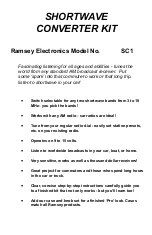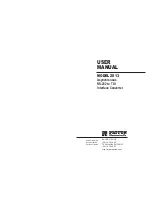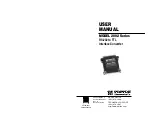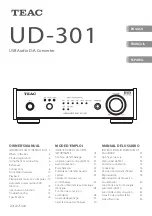
1
3
2
4
6
Using the Self-Check Function
●
The MN Converter has a self-check function.
< Dip switch setting>
SW No.
Description of setting
1
2
OFF:fixed
3
4
-
5
M-NET communication self-check (error status) ON:display / OFF:no display
6
Check the communication status ON:RS-232C / OFF:M-NET
7
-
8
The PCB operation check ON:check mode / OFF:no check mode
(1) Performing the PCB operation check (SW-8)
●
lf the MN Converter fails to operate, use the self-check function, according to the procedure below.
1
Short pins number 2 and 3 on the D-SUB connector. (RS-232C transmission and reception)
2
Set SW-8 to ON.
3
Press the reset switch.
4
All the LEDs light, then immediately go out except for LED 8.
5
When SW-1 sets to ON,LED 1 lights.SW-2,SW-3,SW-4,SW-5 and SW-6 are similar to SW-1.
6
When SW-7 sets to ON, LED7 lights, then switches it to OFF,all LEDs except for LED 8 go out.
7
After that, if LED 3 and either LED 1 or 2 Iight, the PCB is operating normally.
(2) Checking the communication status (SW-6)
●
LED 7 (yellow) displays the M-NET or RS-232C communication status.
If communication is taking place, the LED Iights for 0.5 second.
●
If no communication is taking place, LED 7 does not light.
When checking the communication status, have communication performed by a unit operation or a similar method.
(3) M-NET communication self-check (SW-5)
●
LED 1 to 6 display errors in M-NET communication status.
<Display of M-NET error status : SW-5 is ON >
LED No.
Error status
1
Address duplex definition error
2
Bus busy error
3
Hardware error
4
ACK not present error
5
Polarity not set error
6
Send data abnormal error
7
Troubleshooting
●
If the MN Converter does not operate at all
Check whether the power LED is lit.
If not, no power is being supplied.
●
If there is a communication failure
Check PCB operation by the procedure in section 6-1. If the PCB is operating normally, perform the checks below.
●
If no problem is found after checking the PCB, set SW-6 to ON, and operate the data processing device.
LED 7 Iights.
If LED 7 does not light, communication between the MN Converter and the data processing device has failed.
Check that the RS-232C cable is a cross cable.
Check that the cable is firmly connected to the D-SUB connector.
●
Set SW-6 to OFF, and operate the data processing device.
LED 7 Iights.
If LED 7 does not light, M-NET communication has failed.
Set SW-5 to ON, and check the error displayed by the self-check LEDs.
When the error is confirmed, press the reset switch.
This product is designed and intended for use in the residential,
commercial and light-industrial environment.
• Low Voltage Directive 73/23/EEC
• Electromagnetic Compatibility Directive 89/336/EEC
3
Connections
(1) Connecting the MN Converter to a data processing device
CAUTION
Disconnect the transmission line before connecting the RS-232C cable.
- There is a risk of equipment breakdown.
●
The MN Converter has a 25 pin D-SUB connector (female) for connec-
tion to a data processing device. Connect an RS-232C cross cable
(commercially available Length : 15m (49 ft) max) to this connector.
CAUTION
Select an RS-232C cable that can be connected to the serial interface on the data processing device you are
using. (The MN Converter's D-SUB connector has 25 pins.)
●
Indicates the type of RS-232C cable to be used. (For specially-shaped
connectors, contact your data processing device sales outlet.)
●
Connecting to a data processing device (DOS/V type or compatible
model)
CAUTION
A 9 pin - 25 pin D-SUB connector cross cable is required. (not supplied)
(2) Connecting the MN Converter to air conditioning equipment
●
To Connect the MN Converter to an air conditioner, connect the MN Converter and outdoor unit with the accessory cable. Use
the crocodile clip on the cable to connect it to the M-NET terminal block of the outdoor unit. (no polarity)
4
Checking Operation
●
After connecting the transmission line, look through the hole on the
side of the casing to check whether the green LED is lit.
●
If the LED is not lit, no power is being supplied to the MN Converter.
Check the wiring.
5
MN Converter Configuration and Initial Settings
(1) Configuration
●
The MN Converter consists of the upper casing, PCB (printed circuit board)
and lower casing.
●
To make MN Converter initial settings or perform the self-check procedure,
remove the four casing screws to remove the upper casing.
CAUTION
To avoid the risk of electric shock or damage to the PCB, never disassemble the MN Converter with the transmission
line connected. Be certain to disconnect the transmission line before starting work.
(2) Names and functions of parts
(3) Initial switch settings
●
SW-1, SW-2 and SW-3 must be fixed OFF independently of the maintenance tool's version.
●
SW-4, SW-5 , SW-6, SW-7 and SW-8 set ON each according to the self-check function.
After using the self-check function, SW-4, SW-5 , SW-6, SW-7 and SW-8 must be set OFF all.
WT02481X02
GB
2
Before Using the MN Converter
●
Check that the box contains the following parts:
1
MN Converter (with the transmission line: accessory)
2
Installation manual
CAUTION
WARNING
■
This converter is a device which is exclusively for maintenance.
Do not use it for any purpose other than maintenance.
Since this converter is constructed from an ELV circuit (Extra-Low
Voltage circuit), a data processing device which is connected to this
converter is also an ELV circuit. Hazardous voltage may be input to
the data processing device.
Since this converter and a data processing device which is connected
to it are regarded as an ELV circuit. Do not use this converter for
anyone other than service men who have a handling knowledge about
hazardous voltage inputting equipments.
If this converter connects or operates wrong, this converter or a data
processing device which is connected to this converter, may cause
to be broken, to go up in smoke, or an electric shock.
■
Do not place objects on top of the MN Converter.
There is a risk of fire or electric shock.
■
Always disconnect the transmission line by grasping the plug.
Pulling the cord may damage the transmission line, preventing nor-
mal measurement or causing equipment breakdown.
■
Do not use the MN Converter if the cables or transmission line
are damaged.
There is a risk of equipment breakdown, or measurement errors from
a transmission line short circuit.
■
Never contact the power supply with the control wiring termi-
nals.
Doing so will certainly cause the MN Converter to catch fire.
■
Do not place the MN Converter in highly dusty, humid or damp
locations.
There is a risk of fire or electric shock.
■
If water, metal objects or extraneous matter enters the MN Con-
verter, stop operation and disconnect the transmission line.
There is a risk of fire or electric shock if use it continued.
■
Do not splash water on the MN Converter or touch it with wet
hands.
The MN Converter is not water-resistant. If water contacts it, wipe it
off with a dry cloth to prevent the risk of electric shock or equipment
breakdown.
■
Do not use in any place at a tempareture of more than 40
°
C
(104
°
F) or less than 0
°
C (32
°
F)
or exposed to direct sunlight.
Doing so may cause a malfunction.
Mitsubishi Electric Air-conditioner Network System
MN CONVERTER
CMS-MNF
Installation Manual
1
Safety Precautions
●
Before using the MN Converter, read this section thoroughly to ensure correct operation.
●
Be sure to obey the precautions listed here as they contain important safety information.
WARNING
Precautions which may result in death or serious injury if not followed.
CAUTION
Precautions which may result in serious harm if not followed.
●
After reading this manual, keep it in a place readily accessible to the user.
This manual should be given to any new personnel operating the MN Converter.
■
If the MN Converter malfunctions (if you smell burning), stop
operation and disconnect the transmission line.
lf you continue to use the MN Converter after it malfunctions, fire or
breakdown may result.
<A function of the MN Converter>
MN Converter can convert the signal of M-NET transmission line into the signal of RS-232C Iine, for the purpose of
indicating the operating condition of the air-conditioner unit on a data processing device.
This converter and the M-NET transmission line of the air conditioner are constructed from an ELV (Extra-Low
Voltage circuit).If the air conditiner causes a dielectric breakdown, hazardous voltage may be input to this
converter and the data processing device which is connected to this converter, always observe the following.
If this converter connects or operates wrong, this converter or a data processing device which is connected to
this converter, may cause to be broken, to go up in smoke, or a electric shock.
- If this converter connects to the M-NET transmission line of the air conditioner, use a tester etc...and check
that the output voltage of M-NET transmission line is 30V DC or less before performing the connection.
- Never touch the M-NET transmission line of the air conditioner with your hands.
- Do not leave the converter connected to the M-NET transmission Iine of the air conditioner.
- Do not connect the converter to the power supply terminal of the air conditioner.
WARNING
The product at hand is based on
the following EU regulations:
Installation Manual
MN Converter
Transmission line
RS-232C Interface
D-SUB 25 pin connector (female)
data
processing
device
MN
Converter
9 pin D-SUB connector model
Connect to M-NET terminal block on outdoor unit (TB3) using crocodile clip.
RS-232C cable
Indoor
Unit
Outdoor
Unit
Remote
Controller
MN
Converter
date
processing
device
Green LED
Hole in casing
Yellow LED
Upper casing
PCB
Lower casing
Casing screws
M-NET terminal block
· M-NET transmission line connection
Power supply switching connector
· Transmission line power supply when connected
Self-check LED
Reset switch
Dip swiches for function setting
· Self-check display mode
· Display switching
· Simple PCB check mode
Power
display LED
D-SUB 25 pin
connector (femate)
Communication
display LED



